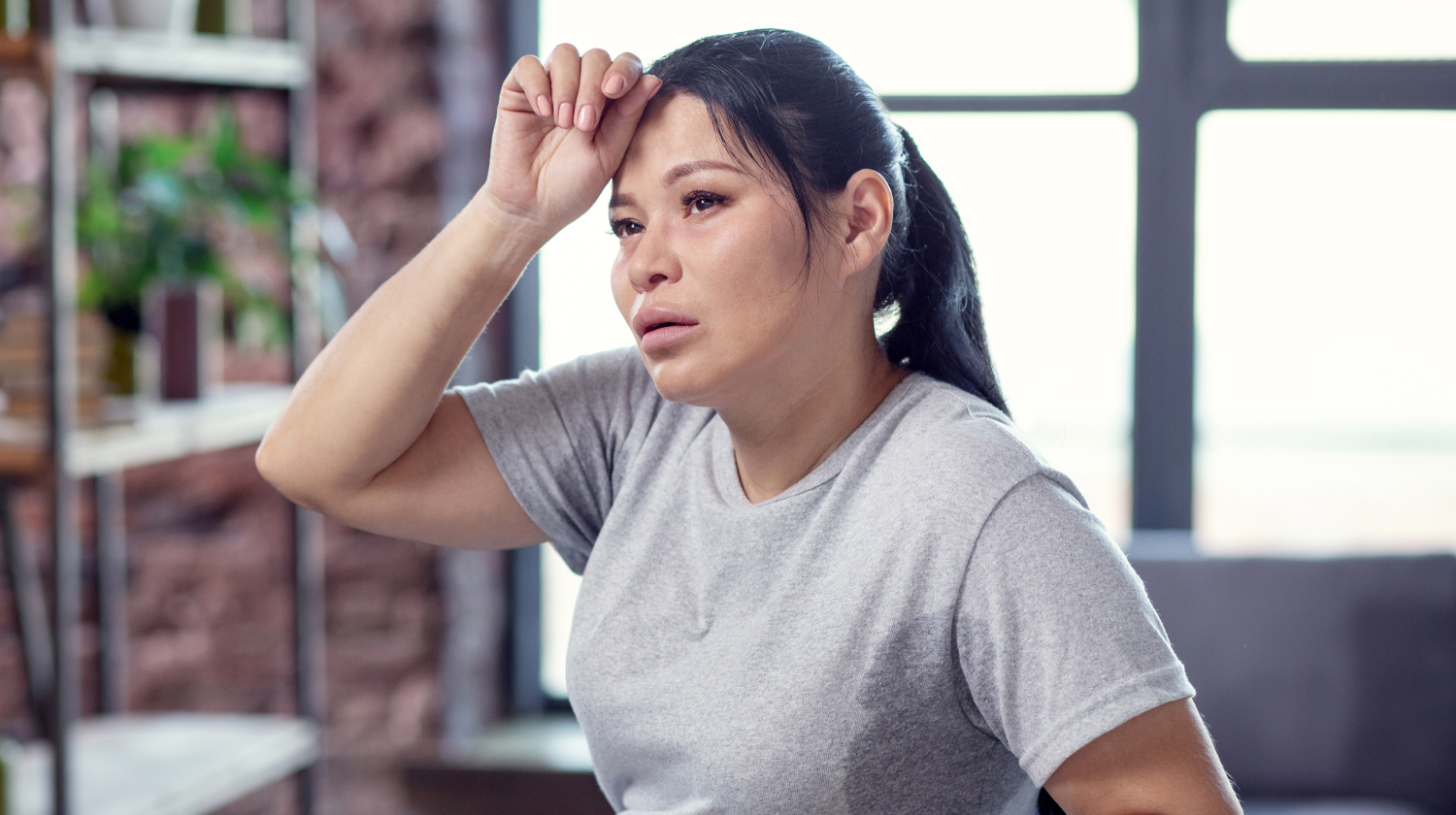Anxiety Sweating: The Link Between Them & How To Manage It 2024

As we engage in our daily life, we may overlook certain aspects of our health. It can be easy to detect stomach pains or constant headaches, but symptoms like excessive sweating may go unnoticed. However, if you examine your daily habits and other possible symptoms, such as nausea or restlessness, you might discover that you suffer from anxiety sweating.
If you live with generalized anxiety disorder,[1] you might be unable to control your worry and anxiety-riddled thoughts. These thoughts can become overwhelming and disrupt your daily functions. Sweating, muscle spasms, and gastrointestinal troubles, often develop from this disorder. We usually associate anxiety with feelings of nervousness and pursue ways to cope with our stressors. Here, we will discuss helpful lifestyle changes, like incorporating outdoor time and prioritizing good sleep hygiene, to help relieve nervousness and alleviate physical manifestations of anxiety disorders.
Can Anxiety Cause Sweating?
Unfortunately, anxiety can cause sweating. Uncontrollable anxious thoughts can cause your body to enter fight-or-flight mode, leading to a rise in body temperature and excessive sweating. Thankfully, there are specific actions you can take to minimize this side effect, no matter what type of anxiety you may experience.
The Connection Between Anxiety And Sweating
When someone who lives with anxiety detects a threat, they may experience anxious behaviors, or the body will go into fight-or-flight mode as a defense mechanism. This can initiate a nervous system[2] cascade, in which stress hormones like cortisol and adrenaline are released, prompting a physiological response. Increased body temperature and flushed skin can cause the nervous system to trigger the sweat glands[3] in an attempt to cool the body.
Why Anxiety Causes Sweating
Can anxiety cause sweating? In addition to other biological responses, anxiety can trigger excessive sweating. Fluid is eliminated through the skin instead of the kidneys, resulting in anxious sweating.
Not only can anxiety cause nervous sweating, but it can also trigger hot flashes and chills. And at times, you may feel tingling sensations paired with nausea and lightheadedness. When this intensifies, you may notice anxiety symptoms that reflect a panic attack, like accelerated heart rate and difficulty breathing.
Furthermore, sweating can cause anxiety, usually due to self-consciousness. The reasons behind increased perspiration are often unknown, but hyperactive apocrine sweat glands located in the armpits and groin can lead to body odor.
Body odor and visible sweat stains can make you self-conscious and socially withdrawn. If this preoccupation and anxiety dictate your choice of employment or social interactions, it may become a social anxiety disorder.
How To Manage Sweating Caused By Anxiety
Deep Breathing And Mindfulness Activities

Deep breathing can be a relaxing way to steady the physiological responses to anxiety triggers. One of the natural remedies for anxiety is the Valsalva maneuver, which consists of taking a deep breath and holding your nose closed for ten seconds. This can effectively decrease your heart rate and stabilize your breathing when anxious feelings produce increased sweating. Additionally, mindfulness techniques, like meditation, can help you slow down and lessen your preoccupation with stressors.
Deep breathing and meditation can distract you from common anxiety triggers and help you navigate stressful events.
Time Outdoors And Physical Activity

Regular exercise can be a great way to reset your stress response. It may seem counterproductive to do physical activity and sweat more, but it’s all about getting your body moving and blood pumping. This regulation supports the adequate and efficient functioning of the nervous system and other metabolic processes.
A good way to reduce sweating when uneasy feelings arise is to combine exercise and outdoor time. Exercising outside has been positively connected to improved self-esteem and vitality, as well as enhanced psychological well-being[4] and overall wellness.
Lifestyle Changes

Positive dietary habits, affirming self-talk, and improved sleep are a few additional natural remedies for anxiety sweating. Increasing your consumption of plant-based foods can provide the beneficial nutrients needed for ideal neurological function. These nutrients[5] include amino acids, vitamins C, D, and E, zinc, magnesium, and more.
You can also try cutting out high-sugar foods and opt for complex carbohydrates, like whole grains or high-fiber fruits and vegetables. These foods help maintain balanced blood sugar levels and can promote calmness.
Encourage yourself and acknowledge that with time you can overcome anxiety sweat. Remember that sweating is a natural response to anxious situations, and treatments are available.
Additionally, it may be helpful to keep a journal tracking your sweat episodes related to anxious behaviors. However, try not to become preoccupied with it.
Therapy And Counseling

It might help to reach out to a friend or counselor to discuss your experiences with stress sweat. You might be surprised to discover how common this condition is and how many people are available to support you. Online therapy may also be useful, as it can be a cost-effective and individualized resource.
Other Common Causes Of Sweating
Reproductive Hormones And Menopause
Extreme fluctuations in reproductive hormones can lead to night sweats and anxiety in females. Fluctuations of hormones[6] like estrogen and progesterone can increase your internal temperature, resulting in hot flashes or night sweats. These cooling mechanisms are often seen during premenstrual syndrome, pregnancy, and menopause.
Thyroid Complications
Thyroid disorders can also cause you to develop stress sweat. Thyroid hormones are pertinent to regulating body temperature, and if hormone levels are too high or too low, it can wreak havoc on the body. Sweating is commonly seen with an overactive thyroid,[7] but an underactive thyroid can also disrupt body temperature regulation and lead to sweating.
There is overlap among these hormonal processes, as hypothyroidism has been connected to complications of menopause. Estrogen levels are also thought to impact thyroid function, which could be why menopause and thyroid dysfunction can mirror and contribute to each other’s symptoms. For some women experiencing menopause,[8] improving thyroid function can help alleviate menopause symptoms.
Diabetes And Nervous System Disorders
Diabetes-related complications can affect body temperature maintenance and cause sweating to occur too frequently or too scarcely. The major culprits are low blood sugar and nervous system damage related to diabetes. Hypoglycemia, characterized by low blood sugar, can initiate a fight-or-flight response and lead to excess sweating.
On the contrary, elevated blood sugar can cause diabetic neuropathy. This condition, characterized by a lack of nerve function, can keep the sweat glands working overtime.
Medications
Excessive sweating[3] can also occur as a side effect of certain medications, including steroids, pain relievers, and antidepressants. Research indicates that up to 22% of antidepressant users[9] report they experience night sweats. Blood sugar-reducing medications and hormone therapy drugs, like levothyroxine,[10] may also cause sweating.
The Bottom Line
Many factors can contribute to or cause excessive sweating. In some cases, sweating may cause anxiety,[11] and in others, anxiety causes sweating. This is a natural stress response cascade in which your body produces sweat as a defense mechanism.
Sweating occurs as a physical response to stressors and triggers. With anxiety and anxious behaviors, threats are perceived more frequently and often more intensely, resulting in increased perspiration.
Other helpful tips to alleviate anxiety-induced sweating include staying hydrated, wearing breathable clothing, and avoiding stimulants to reduce nervous system irritation. You might also consider using prescription-strength antiperspirant and removing spicy foods from your diet.
Doing your best to address anxiety can support efforts to reduce negative emotions and nervous sweating. Relaxing amid your life stressors and relying on natural remedies can promote improvements. Additionally, lifestyle habits like exercising, eating a well-balanced diet, practicing good sleep hygiene, and going to counseling, can also garner positive results.
+ 11 sources
Health Canal avoids using tertiary references. We have strict sourcing guidelines and rely on peer-reviewed studies, academic researches from medical associations and institutions. To ensure the accuracy of articles in Health Canal, you can read more about the editorial process here
- Mayo Clinic. (2017). Generalized anxiety disorder – Symptoms and causes. [online] Available at: https://www.mayoclinic.org/diseases-conditions/generalized-anxiety-disorder/symptoms-causes/syc-20360803
- Kasia Kozlowska, Walker, P.J., McLean, L. and Pascal Carrive (2015). Fear and the Defense Cascade. [online] 23(4), pp.263–287. doi:https://doi.org/10.1097/hrp.0000000000000065.
- Mayo Clinic. (2022). Hyperhidrosis – Symptoms and causes. [online] Available at: https://www.mayoclinic.org/diseases-conditions/hyperhidrosis/symptoms-causes/syc-20367152
- Lawton, E., Brymer, E., Clough, P.J. and Denovan, A. (2017). The Relationship between the Physical Activity Environment, Nature Relatedness, Anxiety, and the Psychological Well-being Benefits of Regular Exercisers. [online] 8. doi:https://doi.org/10.3389/fpsyg.2017.01058.
- Wendołowicz A;Stefańska E;Ostrowska L (2018). Influence of selected dietary components on the functioning of the human nervous system. Roczniki Panstwowego Zakladu Higieny, [online] 69(1). Available at: https://pubmed.ncbi.nlm.nih.gov/29517182/#:~:text=The%20potentially%20beneficial%20nutrients%20with,(selenium%2C%20zinc%2C%20magnesium%2C
- Clinic, C. (2022). Night Sweats: Menopause, Other Causes & Treatment – Cleveland Clinic. [online] Cleveland Clinic. Available at: https://my.clevelandclinic.org/health/symptoms/16562-night-sweats
- Pennmedicine.org. (2022). Signs That You Should Get Your Thyroid Checked | Penn Medicine. [online] Available at: https://www.pennmedicine.org/updates/blogs/health-and-wellness/2017/august/thyroid#:~:text=Hyperthyroidism%20may%20cause%20sensitivity%20to,%25%20energy%20and%2035%25%20heat.
- Małgorzata Gietka-Czernel (2017). The thyroid gland in postmenopausal women: physiology and diseases. [online] 2, pp.33–37. doi:https://doi.org/10.5114/pm.2017.68588.
- Kolli, V. and Ramaswamy, S. (2013). Improvement of antidepressant-induced sweating with as-required benztropine. Innovations in clinical neuroscience, [online] 10(11-12), pp.10–1. Available at: https://www.ncbi.nlm.nih.gov/pmc/articles/PMC3931183/
- NHS Choices (2023). Treatment – Underactive thyroid (hypothyroidism). [online] Available at: https://www.nhs.uk/conditions/underactive-thyroid-hypothyroidism/treatment/#:~:text=Levothyroxine%20does%20not%20usually%20have,headaches%2C%20diarrhoea%20and%20being%20sick.
- Parashar, K., Adlam, T. and Potts, G. (2023). The Impact of Hyperhidrosis on Quality of Life: A Review of the Literature. [online] 24(2), pp.187–198. doi:https://doi.org/10.1007/s40257-022-00743-7.



